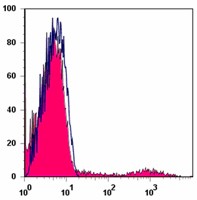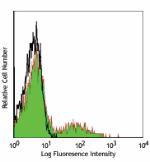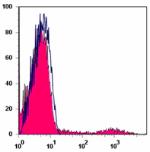- Clone
- HLADQ1 (See other available formats)
- Regulatory Status
- RUO
- Other Names
- MHC class II DQ monomorphic antigen, MHC II
- Isotype
- Mouse IgG1, κ

-

Human peripheral blood lymphocytes stained with HLADQ1 PE and overlayed with isotype control
| Cat # | Size | Price | Quantity Check Availability | ||
|---|---|---|---|---|---|
| 318105 | 25 tests | $122.00 | |||
| 318106 | 100 tests | $268.00 | |||
HLA-DQ is also known as MHC class II DQ monomorphic antigen. The major histocompatibility complex is composed of two heterodimeric glycoproteins (α and β chains) with apparent molecular weights of 27 and 32 kD. In contrast to other MHC class II molecules, both polypeptide chains of HLA-DQ are polymorphic, with the α chain showing an extremely high degree of polymorphism. HLA-DQ is expressed on B cells in the peripheral blood, and weakly expressed on activated T cells and some monocytes. HLA-DQ is absent on hematopoietic progenitors, resting T cells, erythrocytes, and platelets. HLA-DQ is expressed after HLA-DR and HLA-DP in hematopoietic development. HLA-DQ presents peptide fragments mainly from degraded intravesicular and extracellular proteins to CD4+ T lymphocytes. Specific alleles of HLA-DQ have been linked to the pathogenesis of several autoimmune diseases (including diabetes), both as a susceptibility and resistance factor depending on the particular polymorphism.
Product Details
- Verified Reactivity
- Human
- Antibody Type
- Monoclonal
- Host Species
- Mouse
- Formulation
- Phosphate-buffered solution, pH 7.2, containing 0.09% sodium azide and BSA (origin USA)
- Preparation
- The antibody was purified by affinity chromatography, and conjugated with PE under optimal conditions.
- Concentration
- Lot-specific (to obtain lot-specific concentration and expiration, please enter the lot number in our Certificate of Analysis online tool.)
- Storage & Handling
- The antibody solution should be stored undiluted between 2°C and 8°C, and protected from prolonged exposure to light. Do not freeze.
- Application
-
FC - Quality tested
- Recommended Usage
-
Each lot of this antibody is quality control tested by immunofluorescent staining with flow cytometric analysis. For flow cytometric staining, the suggested use of this reagent is 5 µl per million cells in 100 µl staining volume or 5 µl per 100 µl of whole blood.
- Excitation Laser
-
Blue Laser (488 nm)
Green Laser (532 nm)/Yellow-Green Laser (561 nm)
- Application Notes
-
The antibody HLADQ1 reacts with HLA-DQ 4,5,6,7,8,9 but does not react with DQ2, DR or DP. Additional reported (for the relevant formats) applications include: immunohistochemical staining of acetone-fixed frozen sections and formalin-fixed paraffin-embedded tissues.
-
Application References
(PubMed link indicates BioLegend citation) - Product Citations
-
- RRID
-
AB_604127 (BioLegend Cat. No. 318105)
AB_604127 (BioLegend Cat. No. 318106)
Antigen Details
- Structure
- Major histocompatability complex composed of two heterodimeric glycoproteins (α and β chain) with apparent molecular weights of 27 and 32 kD. In contrast to other MHC class II molecules, both polypeptide chains of HLA-DQ are polymorphic.
- Distribution
-
Expressed on B cells in the peripheral blood, weakly on activated T cells and some monocytes. Absent on hematopoietic progenitors, resting T cells, erythrocytes and platelets. Expressed after HLA-DR and HLA-DP in hematopoietic development.
- Function
- HLA-DQ presents peptide fragments mainly from degraded intravesicular and extracellular proteins to CD4+ lymphocytes. Specific alleles are linked to the pathogenesis of several autoimmune diseases.
- Interaction
- CD3/TCR, CD4
- Cell Type
- Thymocytes, T cells, Leukemia
- Biology Area
- Immunology, Innate Immunity
- Molecular Family
- MHC Antigens
- Antigen References
-
1. So AK, et al. 1987. J. Immunol. 139:3506.
2. Gyllensten UB Erlih HA. 1989. Proc. Natl. Acad. Sci. USA 86:9986.
3. Sonderstrup G and McDevitt HO. 2001. J. Clin. Invest. 107:795. - Gene ID
- 3117 View all products for this Gene ID 3119 View all products for this Gene ID
- UniProt
- View information about HLA-DQ on UniProt.org
Other Formats
View All HLA-DQ Reagents Request Custom Conjugation| Description | Clone | Applications |
|---|---|---|
| FITC anti-human HLA-DQ | HLADQ1 | FC |
| PE anti-human HLA-DQ | HLADQ1 | FC |
Compare Data Across All Formats
This data display is provided for general comparisons between formats.
Your actual data may vary due to variations in samples, target cells, instruments and their settings, staining conditions, and other factors.
If you need assistance with selecting the best format contact our expert technical support team.
-
FITC anti-human HLA-DQ

Human peripheral blood lymphocytes stained with HLA-DQ1 FITC -
PE anti-human HLA-DQ

Human peripheral blood lymphocytes stained with HLADQ1 PE an...
